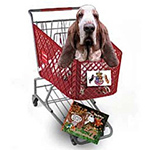Warm weather warnings! Things Toxic to Hounds
Howllo Fellow Hound and Warm Weather Lovers: With the warm weather coming up our hounds will be outside more with us. Here are a few reminders of what items are toxic to dogs. I found this article on the internet and it was mostly about Alcohol, but please see a very good list at the bottom of other items. Take time now to read and print out what you want to have handy in an emergency situation. Then, go have fun!
Alcohol – don’t set your drinks on the ground while you tend to the BBQ.
Alcohol consumption in pets is serious, Veterinarian Brent Fischer of DoveLewis Emergency Animal Hospital in Portland has advise.
Fischer said alcohol toxicity in dogs is very similar to that in people.
“It works under the same principles of severity, based on amount consumed per body weight of the animal,” Fischer said. “… Therefore, a very small Chihuahua may be intoxicated with a very small amount compared to a large St. Bernard, who would need to consume a much greater quantity.”
He said the absorption of alcohol in a pet’s stomach is very rapid but can be slowed by the presence of food.
Fischer said clinical signs of alcohol poisoning in pets include ataxia (staggering and uncoordinated movement), sedation, hypothermia (low body temperature) and possible light sensitivity.
Look for these signs within the first hour of ingestion, Fischer said.
Severe intoxication can cause an animal to vomit, suffer respiratory depression (slow to no breathing) and death.
Fischer urges pet parents who know or suspect their pet has consumed alcohol, to seek veterinary medical attention immediately.
Other tips to know if your animal has consumed alcohol:
If you pet has vomited, collect a sample in a sealed plastic bag. It may be of help to your vet or the toxicology lab. Also, be sure to take the bottle or container the animal drank from with you.
Be ready with the animal’s breed, age, sex and weight. A vet can assess all this information, but having it handy helps.
Be certain you can describe the animal’s symptoms clearly and know what the pet ingested (if known), the amount and the time elapsed since exposure.
Finally, keep your vet’s phone number, as well as that of the local emergency veterinary clinic (after-hours medical facility) and the American Society for the Prevention of Cruelty to Animals’ Animal Poison Control Center number handy (by the phone, programmed into a phone, in an address book) in advance of an emergency.
The ASPCA poison-control center charges a $60 fee for its consultation services that can be billed to a credit card. The number is
(888) 426-4435.
Pet owners also should consider investing in an emergency first-aid kit for animals.
Having a fresh bottle of 3-percent USP hydrogen peroxide to induce vomiting can be handy. Be sure to have a turkey baster or bulb syringe (to administer the peroxide) with the kit.
Other items toxic to hounds:
Animal toxins toads, insects, spiders, snakes and scorpions
Blue-green algae in ponds
Citronella candles
Cocoa mulch
Compost-pile fertilizers
Flea products
Outdoor plants and plant bulbs
Swimming-pool treatment supplies
Fly bait containing methomyl
Slug and snail bait containing metaldehyde
Rat and mouse bait
Human medications that can be potentially lethal to pets, even in small doses, include:
Pain killers
Cold medicines
Anti-cancer drugs
Antidepressants
Vitamins
Diet pills
Do you have any other items you would like to add? Please do via the comment section.
More safety tips Later…Cat, Chaps and Emma




